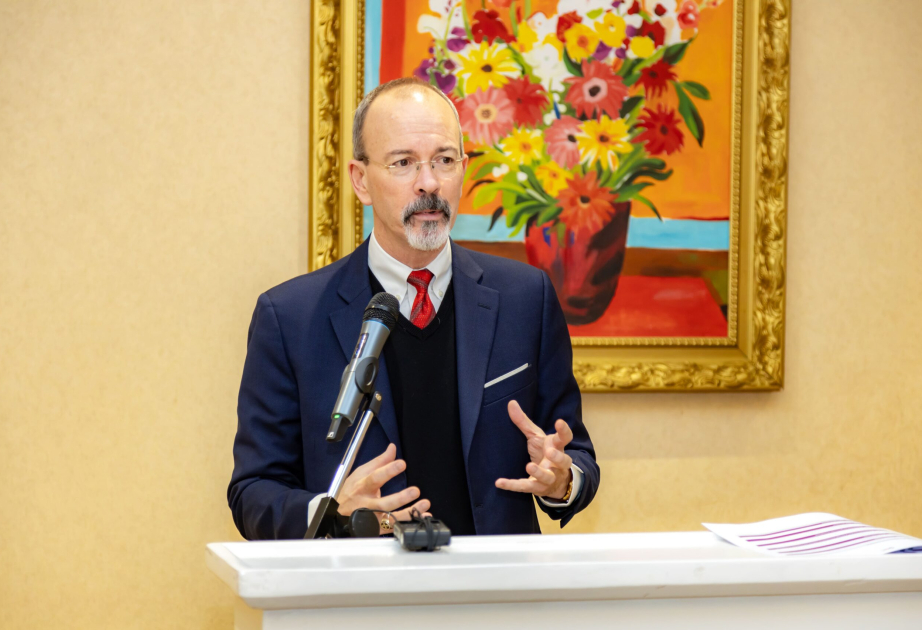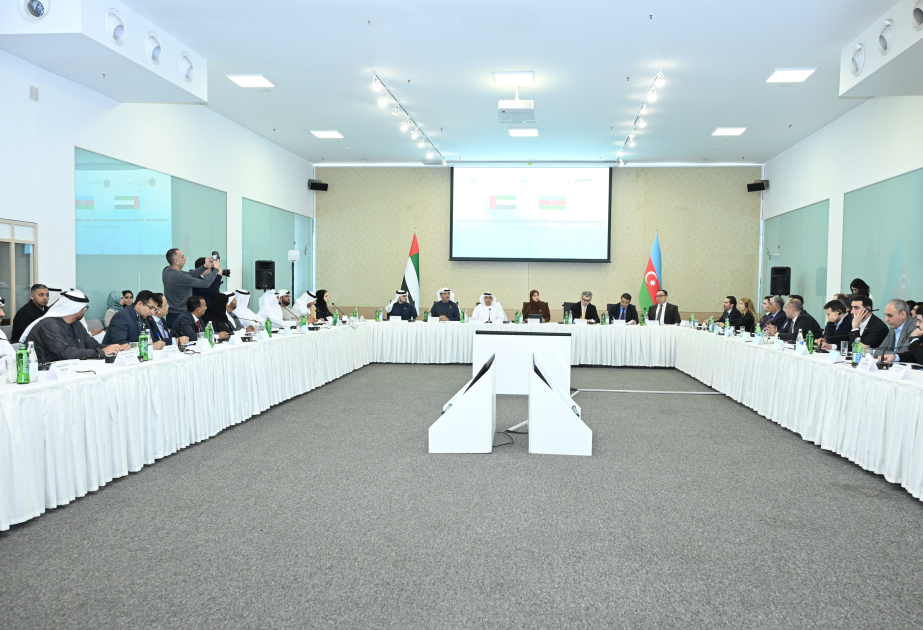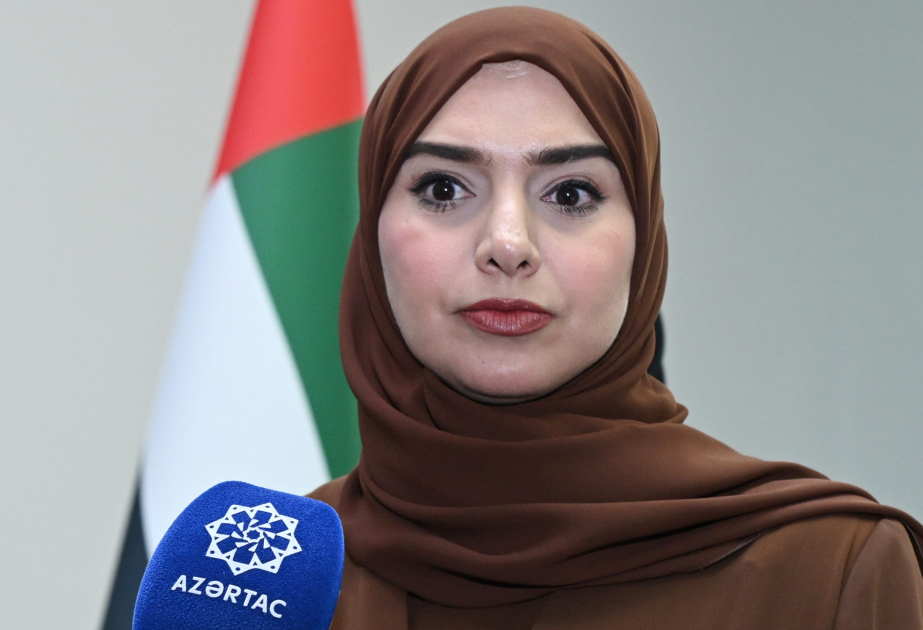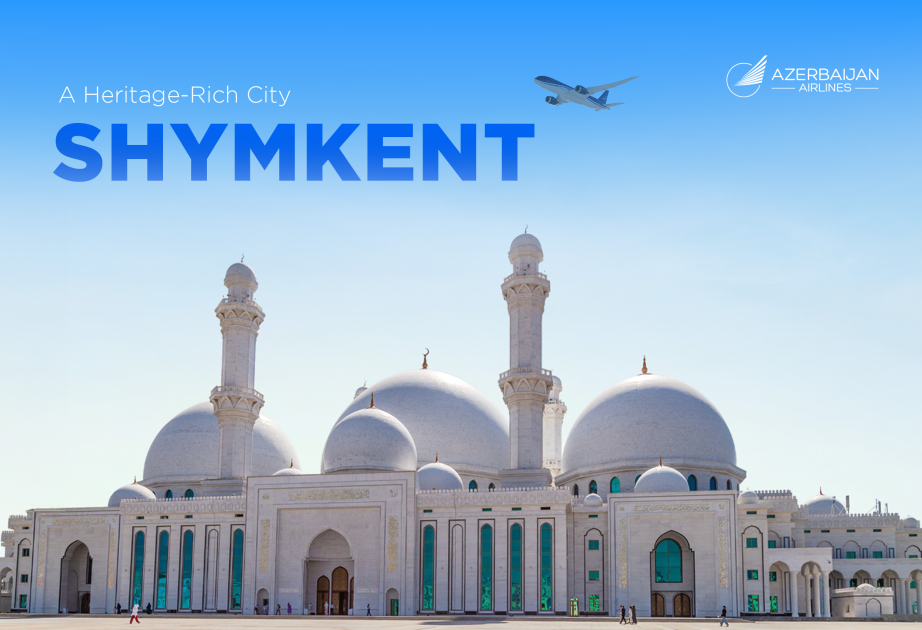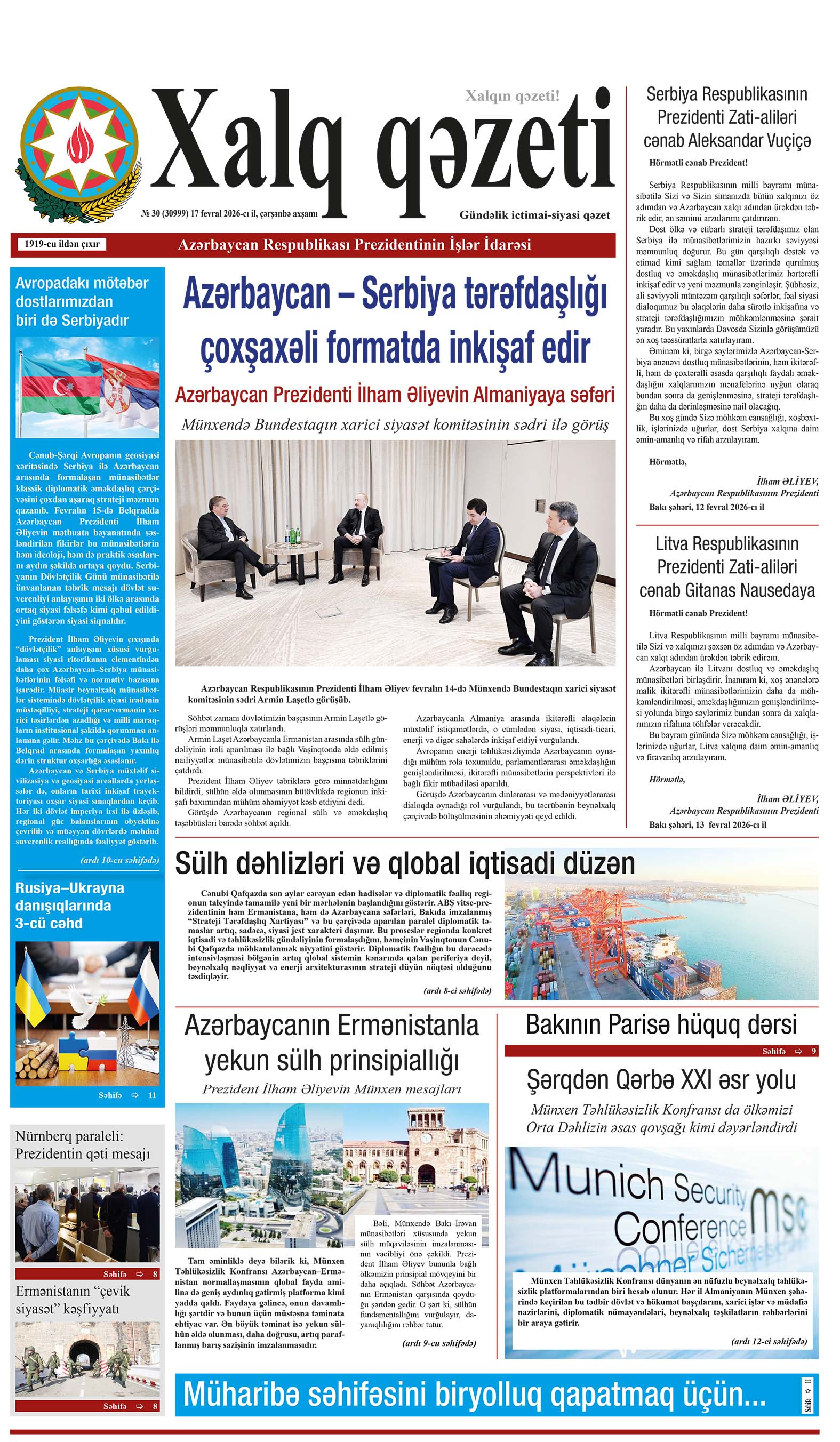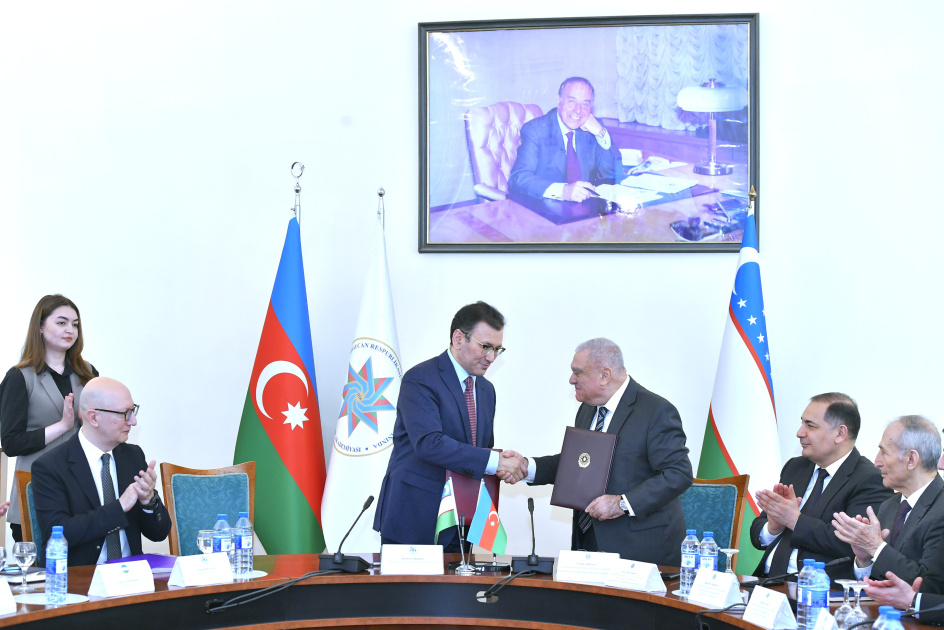OECD: Azerbaijan is improving with respect to green energy and sustainability goals - INTERVIEW
AZERTAC presents an exclusive interview with William Tompson, OECD Head of Division, Eurasia, Directorate for Global Relations and Cooperation
-What are the main areas of cooperation between Azerbaijan and the OECD at present?
-Azerbaijan's engagement with the OECD has grown significantly in recent years, encompassing a wide range of areas such as public governance, anti-corruption, economic diversification, SME policies and entrepreneurship, education and skills, digital transformation, taxation, energy policy, and the green transition. The country actively participates in various OECD programmes, networks, and projects, including the Anti-Corruption Network for Eastern Europe and Central Asia, the OECD Eurasia Competitiveness Programme, the Green Action Task Force, and the Support for Improvement in Governance and Management (SIGMA) programme.
Additionally, Azerbaijan is a member of the Global Forum on Transparency and Exchange of Information for Tax Purposes (GFTEOI) and a Participant in the OECD Development Assistance Committee (DAC). The country is also an Associate in the Base Erosion and Profit Shifting (BEPS) project and benefits from regional OECD projects funded by the EU, such as EU4Business, EU4Energy, EU4Environment, and EU4Integrity.
-What impact does cooperation with the OECD have on the economic development of Azerbaijan?
-Azerbaijan's work with the OECD has focused chiefly on helping the country work towards a greater diversification of economic activity, including output, employment and exports, by further improving conditions for entrepreneurship, investment and innovation, particularly outside the country's very well developed and successful hydrocarbon sector. Economic diversification will help Azerbaijan manage the low-carbon transition away from fossil fuels, as well creating more – and more productive – jobs outside the oil and gas sector, which is very capital intensive and thus generates fewer jobs than many other activities. Diversification can also help Azerbaijan reduce its exposure to commodity-price shocks.
-What specific OECD initiatives have helped Azerbaijan in the area of improving public administration? What OECD recommendations have been offered to Azerbaijan to improve its tax system?
-In the area of public administration reform, Azerbaijan participates in the work of SIGMA (Support for Improvement in Governance and Management), a joint initiative of the OECD and the European Union. Its key objective is to strengthen the foundations for improved public governance, and hence support socio-economic development through building the capacities of the public sector, enhancing horizontal governance and improving the design and implementation of public administration reforms, including proper prioritisation, sequencing and budgeting. We have been working with our partners on strengthening their public governance systems and public administration capacities since 1992.
In the area of taxation, Azerbaijan deposited its instrument of ratification for the BEPS Convention in September 2024, underlining a strong commitment to prevent the abuse of tax treaties and base erosion and profit shifting by multinational enterprises. The BEPS Convention will enter into force in January, 2025 for Azerbaijan. Azerbaijan is also a member of the Global Forum on Transparency and Exchange of Information for Tax Purpose (GFTEOI) and recently completed a second round peer review analyzing the practical implementation of the standard of transparency and exchange of information on request (EOIR) in Azerbaijan. Azerbaijan and OECD could also further work on topics such as carbon pricing options and how different choices could affect CBAM (EU's Carbon Border Adjustment Mechanism) levies.
-How does the OECD assist Azerbaijan in the area of environmental protection and sustainable development?
-Azerbaijan plays an active role in the Green Economy and Environment (GREEN) Action Task Force, which supports transition economies in Eastern Europe, the Caucasus, and Central Asia to integrate environmental considerations into their broader economic, social, and political reforms. This initiative seeks to improve environmental performance while promoting sustainable growth, developing human capital, encouraging green investments, and fostering dialogue and the exchange of best practices.
Azerbaijan also participates in regional projects funded by the EU, including EU4Energy and EU4Environment. EU4Energy, implemented in partnership with the International Energy Agency (IEA), supports Focus Countries in developing and implementing sustainable energy policies and fostering regional cooperation in the energy sector.
EU4Environment, meanwhile, helps preserve natural capital in Eastern Partner countries, enhancing environmental well-being through policy and legislative changes, greener planning and investment, innovative technologies, and green jobs. It also promotes better environmental governance, improved management of protected areas and forests, and sustainable trade practices.
-What OECD programmes have been implemented in Azerbaijan in the area ofcorporate governance and business transparency?
-In the past two years, the OECD conducted a Review of the Corporate Governance of Azerbaijan Investment Holding and its State-Owned Enterprises (SOEs), benchmarking the governance framework against the OECD Guidelines on Corporate Governance of SOEs. This review provided evidence-based recommendations to assist Azerbaijani authorities in reforming the state-owned sector and aligning SOE governance with international best practices.
Azerbaijan is also an active participant in the Anti-Corruption Network for Eastern Europe and Central Asia, a regional outreach programme of the OECD Working Group on Bribery. The fifth round of monitoring under the Istanbul Anti-Corruption Action Plan, published in 2024, assessed Azerbaijan's anti-corruption practices and reforms across nine performance areas, including anti-corruption policy, prevention, and enforcement. The report analysed the country's efforts to establish anti-corruption institutions, detect and prosecute corruption cases, and identified areas for improvement. A follow-up report will evaluate Azerbaijan's progress in implementing these recommendations.
Additionally, Azerbaijan is a member of the Global Forum on Transparency and Exchange of Information for Tax Purposes (GFTEOI), a multilateral initiative involving over 170 jurisdictions on an equal footing. As part of this framework, in 2024 the OECD carried out an assessment of Azerbaijan's compliance with standards on transparency and the exchange of information upon request. This assessment evaluated both the country's legal and regulatory framework and the practical implementation of these standards.
-How does the OECD support Azerbaijan in developing innovative technologies and the digital economy?
-The OECD supported Azerbaijan in the development of the digital economy particularly through initiatives aimed at enhancing digitalisation of SMEs. In 2021, Azerbaijan was peer reviewed at the OECD Eurasia Competitiveness Roundtable on the promotion of enterprise digitalisation. Through this study, the OECD offered policy recommendations to promote SME digitalisation in Azerbaijan, identifying measures to improve policy co-ordination, enhance SME access to digital infrastructure, improve regulatory environment, boost digital skills and provide SMEs with targeted financial and non-financial programmes boosting adoption of digital solutions.
-How does the OECD assess Azerbaijan's progress in achieving the Sustainable Development Goals?
-This is not something the OECD tracks systematically, however, we have observed Azerbaijan's gradually improving position in recent UN assessments, which show the country has achieved, or is on track to achieve, around 40% of its SDG targets, with some improvement observed in a further 30%. It ranks close to the top third of the 166 countries in the assessment. Strong growth has contributed to progress in delivering on targets linked to hunger, poverty and employment. We also note improvements with respect to green energy, climate action and sustainability goals.
-What significance does membership in the OECD have for Azerbaijan in the context of global economic integration?
-Azerbaijan is not a Member of the OECD and has not raised the issue of Membership with the Organisation. However, deepening co-operation with the OECD across a range of policy domains helps to ensure not only that Azerbaijan's policymakers can benefit from exchanges of experience and best practice with OECD Members and other non-Member economies, but also that it is able to showcase its own reforms and development progress in discussions that take place in OECD bodies.
-What areas of the economy should Azerbaijan develop taking into account OECD recommendations to achieve a higher level of sustainability?
-From an OECD perspective, sustainability challenges are not, for the most part, about developing specific areas of the economy. The low-carbon transition is a cross-cutting challenge that affects all areas of economic and social life. Of course, there are some exceptions: in the long run, the country needs to reduce its reliance on hydrocarbons and to develop renewable energy sources – and we note the efforts being made to address environmental issues and to meet greenhouse gas reduction targets set under the 2015 Paris agreement, particularly the recent investments in new renewable energy projects and steps to modernise irrigation practices. However, real sustainability will require developing new skills and new patterns of production and consumption across all economic sectors, not merely the phasing out of some "brown" activities and the development of "green" ones. It is a whole-of-economy, whole-of-society challenge.


